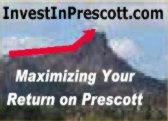|
HOME | LISTINGS SEARCH | BUYER'S GUIDE | SELLER'S GUIDE | RESOURCES | |
|
Prescott's Real Estate Investment |
  
|
|
PRESCOTT REAL ESTATE BUYER'S GUIDE |
| Define Your Investment Goals |
|
| Identify Your Needs & Desires |
|
| Know Your Financial Readiness |
|
| Find an Income Property Advisor |
|
| Establish a Relationship with a Lender |
|
| Develop a Purchase Strategy |
|
| Before you begin your search for Prescott income property you will need to be clear about your financial readiness in order to understand where and what you will buy. Some key questions you will need to answer are: |
|
| Three key areas to consider when evaluating your financial situation are cash flow, leverage and taxation. |
| Cash Flow Create a balance sheet that captures all of your income and expenses to better understand your cash flow and how you will cover all monthly expenses related to owning a Prescott income property. This will also help you determine where and how much investment capital you can access. List all of your current investments - including your own home, stocks, insurance, etc. - and determine if you should be moving money from areas that are not performing well into your real estate investment. Determine an amortization and mortgage term that you are comfortable with and realize the duration of your obligation to a lender. |
| Leverage Prescott Real estate transactions usually involve the borrowing of funds. How much of your own funds you should contribute and how much you should borrow varies in every situation. Leverage rises as the ratio of debt to equity increases. Educate yourself on the basics of leveraging and seek professional advice to ensure you understand the implications of borrowing, interest rates and both positive and negative leverage. |
| Taxation Tax liability applies to income properties in two areas: taxation on operations (the rental revenue) and taxation on profits from sale. However, real estate can have many tax sheltering opportunities. A chartered accountant or taxation lawyer will be able to advise you on the tax liabilities and tax shelters that apply to owning an income property. It is best to consult with your accountant or financial planner to adequately understand all the implications of owning an income property before you begin your search. |